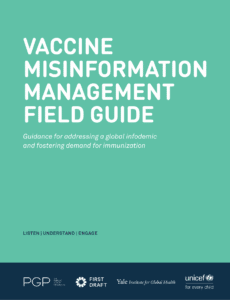Misinformation Alerts
Knowing what misinformation is being shared can help you generate effective messaging.
These insights are based on a combination of automated media monitoring and manual review by public health data analysts. Media data are publicly available data from many sources, such as social media, broadcast television, newspapers and magazines, news websites, online video, blogs, and more. Analysts from the Public Good Projects triangulate this data along with other data from fact checking organizations and investigative sources to provide an accurate, but not exhaustive, list of currently circulating misinformation.
Misinformation Alerts
Knowing what misinformation is being shared can help you generate effective messaging.
These insights are based on a combination of automated media monitoring and manual review by public health data analysts. Media data are publicly available data from many sources, such as social media, broadcast television, newspapers and magazines, news websites, online video, blogs, and more. Analysts from the Public Good Projects triangulate this data along with other data from fact checking organizations and investigative sources to provide an accurate, but not exhaustive, list of currently circulating misinformation.Alerts are categorized as high, medium, and low risk.
- High risk alerts: Narratives with widespread circulation across communities, high engagement, exponential velocity, and a high potential to impact health decisions. Are often more memorable than accurate information.
- Medium risk alerts: Narratives that are circulating in priority populations and pose some threat to health. Potential for further spread due to the tactics used or because of predicted velocity. Often highlights the questions and concerns of people.
- Low risk alerts: Narratives that are limited in reach, don’t impact your community, or lack the qualities necessary for future spread. May indicate information gaps, confusion, or concerns.
A popular conspiracy theorist aired a segment falsely claiming that COVID-19 vaccines contain toxic DNA and cancer viruses. The video also repeats the disproven claim that cancer rates are “exploding” due to COVID-19 vaccines.
Recommendation: The large audience of the conspiracy theorist increases the risk of his claims. Debunking messaging may emphasize the overwhelming scientific evidence that mRNA COVID-19 vaccines are safe and do not cause cancer. Rigorous independent testing in the U.S. and E.U. has yielded no evidence that residual DNA in vaccines is toxic in any way. Messaging may also emphasize that, after over three years of research in millions of people worldwide, there has never been any evidence of a link between COVID-19 vaccines and cancer diagnosis, progression, recurrence, or death. Fact-Checking Source(s): FactCheck.org, AP News, USA Today 
A controversial physician whose board certification was revoked for promoting “false or inaccurate medical misinformation” claimed in a recent interview to have treated hundreds of patients with COVID-19 vaccine injuries. The physician insists without evidence that 70 percent of the people he treats have so-called “long vax, not long COVID.” Posts sharing the interview claim that “long COVID is code for vaccine injuries.”
Recommendation: The interview garnered over two million views in under 48 hours, and clips have been widely circulated. Debunking messaging may explain that reports of long COVID predate COVID-19 vaccines by nearly a year, and there is no evidence that the condition is a vaccine side effect. On the contrary, research over the last three years has consistently shown that COVID-19 vaccination reduces long COVID risk. Talking points may continue to emphasize that instances of COVID-19 vaccines causing lasting side effects are extremely rare. Fact-Checking Source(s): Full Fact, CIDRAP 
The CDC allegedly released 148 FOIA-requested pages related to myocarditis events following COVID-19 vaccination that were heavily redacted. Critics have accused the agency of a lack of transparency.
Recommendation: Concerns about the safety of COVID-19 vaccines continue to fuel vaccine hesitancy despite the wealth of evidence showing that the vaccines are safe. Messaging may explain that myocarditis after COVID-19 vaccination, which may result from an abnormally high immune response, is very rare, typically mild, and resolves quickly. The risk of myocarditis after COVID-19 infection is much higher than the risk after COVID-19 vaccination. Messaging may also highlight that FOIA requests may be redacted for a number of reasons, including protection of personal information and confidential communication between agencies. Fact Checking Source(s): Yale Medicine, The Conversation
Following a reference about the potential of mRNA cancer vaccines at the State of the Union address, some online falsely claimed that President Joe Biden said that COVID-19 vaccines are being used to cure cancer. Other social media users claim that mRNA cancer vaccines will treat a problem allegedly caused by COVID-19 vaccines.
Recommendation: Vaccine opponents have spent years stirring up unfounded fears about mRNA technology, including life-saving vaccines. Messaging may highlight that false narratives about mRNA vaccine safety are based on fear-based speculation and conspiracy theories. Messaging may also emphasize that several promising mRNA cancer vaccines are currently in clinical trials. mRNA vaccines are safe and based on decades of research. Fact Checking Source(s): Infectious Diseases Society of America, Public Good News 
A recent op-ed by a well-known COVID-19 vaccine opponent is resurfacing false claims online that COVID-19 vaccination triggers long COVID, or “long vax,” in 70 percent of cases.
Recommendation: Debunking messaging may emphasize that reports of long COVID predate COVID-19 vaccines by nearly a year, and there is no evidence that the condition is a vaccine side effect. On the contrary, research over the last three years has consistently shown that COVID-19 vaccination reduces long COVID risk. Instances of vaccines causing lasting side effects are extremely rare. Fact Checking Source(s): Full Fact
A member of Congress proposed the Let Injured Americans Be Legally Empowered (Liable) Act, which would allow Americans to retroactively sue COVID-19 vaccine manufacturers for alleged vaccine injuries. News about the proposed bill has been widely circulated and celebrated among vaccine skeptics.
Recommendation: Messaging may explain that the Public Readiness and Emergency Preparedness (PREP) Act of 2005 provides legal immunity to entities involved in countermeasures (e.g., vaccine production) during public health emergencies (e.g., a pandemic), except in cases of willful misconduct. Under the PREP Act, those injured by emergency countermeasures and their families can seek compensation. As of January 2024, 40 COVID-19 claims have been found eligible for compensation. Claims found ineligible failed to provide medical evidence or proof of injury, missed filing deadlines, or were for products not covered by COVID-19 CICP (i.e., not COVID-19 vaccines). Talking points may reiterate the well-established safety of COVID-19 vaccines. Fact Checking Source(s): Reuters, Infectious Diseases Society of America
A local news story about how mRNA technology is being used to make new flu vaccines is circulating among vaccine opponents, with some claiming that COVID-19 vaccines will be rebranded as flu vaccines.
Recommendation: Messaging may explain that several mRNA flu vaccines are currently in clinical trials, but none have been approved for use or are currently on the market. Talking points may emphasize that mRNA vaccines are safe and based on decades of research. The safety of mRNA COVID-19 vaccines has been rigorously studied in millions of people worldwide for over three years, with no evidence linking them to widespread health issues or deaths. Fact-checking sources: Full Fact, NIH 
The CDC’s updated guidance for respiratory viruses faces criticism from both vaccine skeptics and those who feel the agency isn’t doing enough to protect the public from COVID-19. The guidelines advise people to take similar precautions for COVID-19, the flu, and RSV, including staying up to date on vaccination, isolating until symptoms improve, and wearing a mask for five days after discontinuing isolation. Many posts falsely claim that the CDC said COVID-19 is the same as the flu, while others question why the CDC continues to recommend vaccines for COVID-19.
Recommendation: The negative response to the new guidance reveals a lack of confidence in public health entities. Debunking messaging may explain that the CDC never claimed that COVID-19 is the same as the flu. In fact, a CDC representative stated, “Let’s be clear. Covid-19 is not the flu. It still causes more serious illness and leads to more lasting effects.” Moreover, the CDC recommends vaccines for all three respiratory viruses for those who are eligible. Messaging may also emphasize that the world has evolved dramatically in the four years since COVID-19’s discovery. While the contagiousness of COVID-19 has not changed, public health guidelines have had to evolve over time, so the CDC has issued general respiratory virus isolation recommendations that apply to people who are sick with COVID-19 and as well as people who are sick with other respiratory illnesses. The virus has also undergone countless mutations, and most of the population has gained some level of immunity from vaccines, infection, or both. Staying up to date on COVID-19 vaccines remains essential in preventing severe illness, death, hospitalization, and long COVID. Fact Checking Source(s): CDC
An anti-vaccine social media account that has spread false claims about COVID-19 in the past attempts to link Bill Gates to a rare mosquito-borne virus called Eastern equine encephalitis virus (EEEV) reported in two states in August 2023. The post implies that Gates created the virus to sell new vaccines.
Recommendation: Responding to each conspiracy theory may detract from priority talking points. A few human EEEV cases are recorded in the U.S. each year, including two in Alabama in 2023. In the 1930s, the virus was first found to be transmitted to humans by infected mosquitoes. Although there is currently no EEEV vaccine for humans, vaccines may be developed as they have been in response to other naturally emerging diseases. Fact-checking sources: CNN, CDC 
The CDC recommended an additional dose of the updated monovalent COVID-19 vaccine for adults 65 and older. Some took issue with the recommendation, claiming that government officials were targeting seniors before the election. A congressperson accused the CDC’s immunizations advisory committee of corruption and financial ties to the pharmaceutical industry.
Recommendation: The potential for the discourse to increase vaccine hesitancy in older adults increases its risk. Messaging may emphasize that older adults are the most vulnerable population to serious illness, hospitalization, and death from COVID-19. COVID-19 continues to hospitalize and kill thousands of people weekly, the vast majority of them people 65 and older. Last year, people 65 and older made up over 85 percent of all U.S. COVID-19 deaths. Talking points may also highlight that the 2023-2024 monovalent vaccine dramatically decreased the risk of COVID-19 infection and hospitalization in high-risk adults. Fact-Checking Source(s): National Council on Aging
Alerts are categorized as high, medium, and low risk.
- High risk alerts: Narratives with widespread circulation across communities, high engagement, exponential velocity, and a high potential to impact health decisions. Are often more memorable than accurate information.
- Medium risk alerts: Narratives that are circulating in priority populations and pose some threat to health. Potential for further spread due to the tactics used or because of predicted velocity. Often highlights the questions and concerns of people.
- Low risk alerts: Narratives that are limited in reach, don’t impact your community, or lack the qualities necessary for future spread. May indicate information gaps, confusion, or concerns.
Vaccine Misinformation Guide
Get practical tips for addressing misinformation in this new guide. Click image to download, or see highlights.

